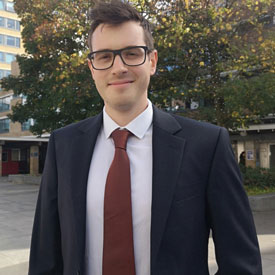
Dominic Roberts
Country Of Origin: United Kingdom
Degree: Full-time MBA, 2019
Consultant, Behavioural Change Management, KPMG
What did you do prior to joining the MBA?
After graduating in 2010, I worked for around 7 years in Recruitment and HR and had the opportunity to spend more than 5 years working abroad in the Czech Republic and Spain.
One week after my last exam at Liverpool University, I relocated and joined a British recruitment company on their graduate scheme in their shared service centre in the Czech Republic, where I worked for just under 4 years focusing on business development for the Pharmaceutical, Medical Device and Biotech sectors in the UK and Switzerland. I was then keen to take on a new challenge and decided to go travelling through South America for 3 months.
After returning to the UK, I relocated again to Cambridge and moved in-house for an American genomics technology company called Illumina, where I was responsible for recruitment across 15 different countries and also led our graduate and intern hiring for Europe. After spending just under 2 years there, I wanted to seek a new challenge and decided to move both to a new country and a new sector, so I joined eDreams ODIGEO in Barcelona, which is Spain’s largest e-commerce company.
Why did you decide to do an MBA?
I had several reasons for choosing to do an MBA. Working in recruitment for several years, I could see that an MBA made a big difference to the careers of candidates applying and in general it was an asset for many candidates.
From my side, I personally felt that I was becoming increasingly narrowed in my field and wanted a broader business background and understanding. Also, when looking at the cost of the MBA in terms of money and time versus the potential long-term return I felt that the investment was well worth it.
I also completed Harvard Business School Online’s CORe programme, which they use as a pre-MBA, and the fact that I really enjoyed the subject matter cemented my decision to take a full-time MBA.
Why did you choose Lancaster University?
After researching many different programmes, mainly concentrating on the FT top 100, I chose Lancaster as my first choice. I liked the fact that the management school is world class but also the wider university is a top-class rising institute with a strong reputation.
I liked that the Lancaster MBA was focused not purely on technical skills but also on developing you as a professional and a person.
I also liked the fact that the class size was small as it gave the opportunity to gain as much contact with the professors as possible, as well as to get to know everyone well. I just couldn’t imagine that being in an MBA programme with hundreds of other students would give the same experience.
Also, I thought the location was a huge benefit as I saw most other MBA programmes were in large cities, which is great but I wanted to focus and dedicate myself to studying. I was also happy to see that the Corporate Challenge was based in London, which was a strong attraction as I was deliberately looking to work in London after completing the MBA.
What did you enjoy most about the Lancaster MBA?
For me personally, I enjoyed the mindful manager modules, and also the strategy modules.
I also enjoyed the consulting assignments where I had the opportunity to work with sector leaders such as BAE Systems and Merlin Entertainments. Having the opportunity to work with clients like this excited me before joining the programme, and it delivered.
What did you need to consider before applying?
You should have a clear idea about what you want to do after the programme career-wise as the year is very intense and goes by quickly, and being in the stage of wanting to explore career options is difficult. You should also be prepared to think of the course as being like working full-time as you are in classes most of the day every day.
Also, there are times when the work load can be highly pressured and you need to be organised in order to make sure to not just hit deadlines but also get good results. Lastly, being genuinely interested and curious as to the subject matter and reading outside of the core texts can really help you to do well in essays and exams.
How do you think the Lancaster MBA benefitted you?
In the programme, I got the opportunity to work with fellow students from many cultures and backgrounds. This helped shape my team working skills and become more open-minded to new ideas and approaches.
As someone who was always a bit hesitant to share my opinion, I really tried to put myself forward in this year. I was awarded by my classmates as the key contributor for the year, which was great.
Overall, I feel more mature and capable, and I’m sure that I am able to take the next stage in my career.
What is your next step now you have completed your Lancaster MBA?
I have recently joined Grant Thornton UK LLP, which is a major Accountancy and Advisory firm, as a Special Projects Manager in London, where I am going to be responsible for growing the Special Projects offering. I’m hoping to put the skills learned into practice.

